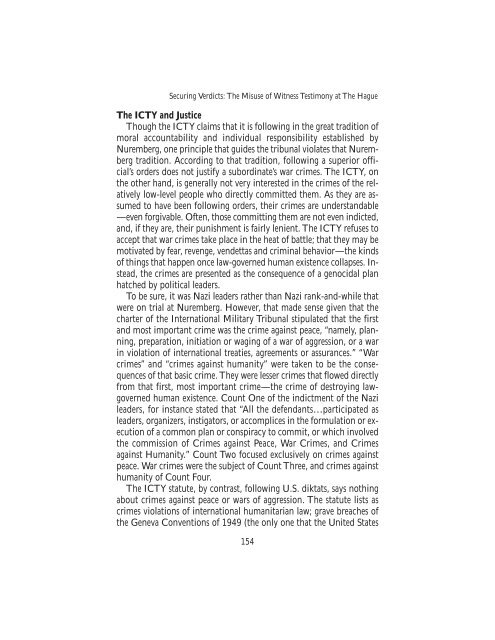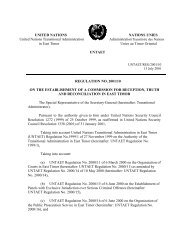The Srebrenica Massacre - Nova Srpska Politicka Misao
The Srebrenica Massacre - Nova Srpska Politicka Misao
The Srebrenica Massacre - Nova Srpska Politicka Misao
Create successful ePaper yourself
Turn your PDF publications into a flip-book with our unique Google optimized e-Paper software.
Securing Verdicts: <strong>The</strong> Misuse of Witness Testimony at <strong>The</strong> Hague<br />
<strong>The</strong> ICTY and Justice<br />
Though the ICTY claims that it is following in the great tradition of<br />
moral accountability and individual responsibility established by<br />
Nuremberg, one principle that guides the tribunal violates that Nuremberg<br />
tradition. According to that tradition, following a superior official’s<br />
orders does not justify a subordinate’s war crimes. <strong>The</strong> ICTY, on<br />
the other hand, is generally not very interested in the crimes of the relatively<br />
low-level people who directly committed them. As they are assumed<br />
to have been following orders, their crimes are under standable<br />
—even forgivable. Often, those committing them are not even indicted,<br />
and, if they are, their punishment is fairly lenient. <strong>The</strong> ICTY refuses to<br />
accept that war crimes take place in the heat of battle; that they may be<br />
motivated by fear, revenge, vendettas and criminal behavior—the kinds<br />
of things that happen once law-governed human existence collapses. Instead,<br />
the crimes are presented as the consequence of a genocidal plan<br />
hatched by political leaders.<br />
To be sure, it was Nazi leaders rather than Nazi rank-and-while that<br />
were on trial at Nuremberg. However, that made sense given that the<br />
charter of the International Military Tribunal stipulated that the first<br />
and most important crime was the crime against peace, “namely, planning,<br />
preparation, initiation or waging of a war of aggression, or a war<br />
in violation of international treaties, agreements or assurances.” “War<br />
crimes” and “crimes against humanity” were taken to be the consequences<br />
of that basic crime. <strong>The</strong>y were lesser crimes that flowed directly<br />
from that first, most important crime—the crime of destroying lawgoverned<br />
human existence. Count One of the indictment of the Nazi<br />
leaders, for instance stated that “All the defendants…participated as<br />
leaders, organizers, instigators, or accomplices in the formulation or execution<br />
of a common plan or conspiracy to commit, or which involved<br />
the commission of Crimes against Peace, War Crimes, and Crimes<br />
against Humanity.” Count Two focused exclusively on crimes against<br />
peace. War crimes were the subject of Count Three, and crimes against<br />
humanity of Count Four.<br />
<strong>The</strong> ICTY statute, by contrast, following U.S. diktats, says nothing<br />
about crimes against peace or wars of aggression. <strong>The</strong> statute lists as<br />
crimes violations of international humanitarian law; grave breaches of<br />
the Geneva Conventions of 1949 (the only one that the United States<br />
154



